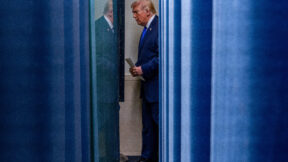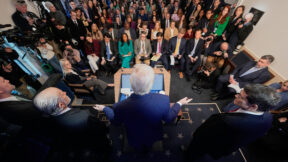Four More Things the Media Isn’t Telling You About The Clinton FBI Notes
Voters have spent much of this Labor Day weekend digesting the news that was generated by the FBI’s decision to release 57 pages of documents related to their investigation of former Secretary of State Hillary Clinton, and while much of that news has been spun negatively for Clinton, the actual documents tend to back her up in many key respects. For example, one of the supposed “lies” that the email investigation has uncovered is this claim that Hillary Clinton has been making since this email kerfuffle began, that she chose to use a personal email account so she wouldn’t have to carry around two devices:
And I have to add, even if I had had two devices, which is obviously permitted — many people do that — you would still have to put the responsibility where it belongs, which is on the official. So I did it for convenience and I now, looking back, think that it might have been smarter to have those two devices from the very beginning.
Hillary’s critics have pointed to testimony and other evidence, including the recently-released FBI report, to assert that Hillary was lying when she said this, because the FBI found that Hillary used as many as 13 different devices, eight while she was at the State Department. FBI Director James Comey even testified to this in July:
What’s weird, though, is that no one, not the media, not the Republicans, not even FBI Director James Comey, deigned to report the most important part of the FBI’s findings about Hillary’s use of multiple devices, as it relates to the truth about her explanation for wanting to use personal email. From page 8 of the report (emphasis mine):
FBI investigation identified 13 total mobile devices associated with her two known phone numbers […] which potentially were used to send e-mails […] eight of which she used during her tenure as Secretary of State. Investigation determined Clinton used in succession 11 e-mail capable Blackberry devices…

She used the devices in succession, as in, one at a time, when the other ones broke. Gee, why do you suppose Comey didn’t point that out when he was asked about it directly, twice, under oath? That’s weird!
A few paragraphs later, the report also talks about five iPads that were “potentially” used for email, but only one of which contained any email at all, and that consisted of three unsent drafts that “did not contain potentially classified information,” refuting another popular anti-Hillary news story.
Here’s another interesting fact from the FBI report that you might not have heard. Remember a few weeks ago when former Secretary of State Colin Powell was going around telling people that he didn’t talk to Hillary about his email practices until a year after she had already begun using personal email at State? Well, it turns out what he meant to say was two days:
On January 23, 2009, Clinton contacted former Secretary of State Colin Powell via e-mail to inquire about his use of a BlackBerry while he was Secretary of State (January 2001 to January 2005). In his e-mail reply, Powell warned Clinton that if it became “public” that Clinton had a BlackBerry, and she used it to “do business,” her e-mails could become “official record[s] and subject to the law.” Powell further advised Clinton, “Be very careful. I got around it all by not saying much and not using systems that captured the data.”
Maybe he just got confused, but when Hillary Clinton gets confused like that, it’s called “lying,” and from this email, it seems the only person trying to “get around” anything is Colin Powell.
Another criticism of Clinton that’s been picked up by the media is the section of Hillary’s interview in which she’s asked about the “(c)” marking on this email, and that she thought it meant alphabetical paragraphs. What might not be clear from the way this is being reported is that she made that guess about a single email, and said separately that she was not familiar with so-called “portion markings” for classified documents:
When asked what the parenthetical “C” meant before a paragraph within the captioned email, CLINTON stated she did not know and could only speculate it was referencing/.paragraphs marked in alphabetical order, CLINTON could not say for sure if the parenthetical “C” is used for portion marking classified documents…
The fact is, though, that because this email bore no classified header, the parenthetical (c) was rendered meaningless. Every document that contains classified information is supposed to have a classified header, and so a knowledge of “portion markings” would never be necessary in order to prevent a classified document from being disseminated improperly. More importantly, absent the header, that (c) is no more a “portion marking” than a number sign without an accompanying topic is a “hashtag.”
There’s also another interesting tidbit from the FBI’s interview of Hillary Clinton, especially given FBI Director James Comey’s insistence that, despite evidence to the contrary, Hillary’s system must have been hacked. Comey said, in his scolding press conference announcing there would be no charges, that “we did not find direct evidence that Secretary Clinton’s personal e-mail domain, in its various configurations since 2009, was successfully hacked,” but said he was sure she probably was because you wouldn’t expect to find evidence of that, except he did find evidence that “hostile actors gained access to the private commercial e-mail accounts of people with whom Secretary Clinton was in regular contact from her personal account. So, apparently you do find evidence when there’s a hack.
Page 27 of the just-released report confirms that “FBI investigation and forensic analysis did not find evidence confirming that Clinton e-mail server systems were compromised by cyber means,” further belying Comey’s certainty that Hillary had to have been hacked, and Hillary’s interview suggests maybe she was right to trust her personal server over a State Department email:
CLINTON. did not consider switching to a state.gov account at this time, but did recall reports of compromises to: state.gov systems. CLINTON understood the email system used by her husband’s personal staff had an excellent track record with respect to security and had never been breached.
Maybe it was just a happy accident, but based on the only evidence available, it appears that information on Hillary Clinton’s email system was, in fact, more secure than that of State Department email accounts. That’s something else you don’t hear reported on when these email stories periodically come out.
There are legitimate discussions and criticisms to be had over this email issues, but that would first require the media to actually read what’s in the reports they’re reporting on, and then report on them fairly. This is a good place to start.
This is an opinion piece. The views expressed in this article are those of just the author.
New: The Mediaite One-Sheet "Newsletter of Newsletters"
Your daily summary and analysis of what the many, many media newsletters are saying and reporting. Subscribe now!






Comments
↓ Scroll down for comments ↓